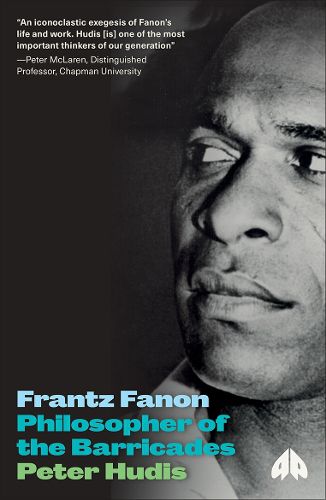Readings Newsletter
Become a Readings Member to make your shopping experience even easier.
Sign in or sign up for free!
You’re not far away from qualifying for FREE standard shipping within Australia
You’ve qualified for FREE standard shipping within Australia
The cart is loading…






Frantz Fanon (1925-1961) was a Caribbean and African psychiatrist, philosopher and revolutionary whose works, including Black Skin, White Masks and The Wretched of the Earth are hugely influential in the fields of post-colonial studies, critical theory, and post-Marxism. His legacy remains with us today, having inspired movements in Palestine, Sri Lanka, the US and South Africa.
This is a critical biography of his extraordinary life. Peter Hudis draws on the expanse of his life and work - from his upbringing in Martinique and early intellectual influences to his mature efforts to fuse psychoanalysis and philosophy and contributions to the anti-colonial struggle in Algeria - to counter the monolithic assumption that Fanon’s contribution to modern thought is defined by the advocacy of violence.
He was a political activist who brought his interests in psychology and philosophy directly to bear on such issues as mutual recognition, democratic participation and political sovereignty. Hudis shows that, as a result, Fanon emerges as neither armchair intellectual nor intransigent militant.
$9.00 standard shipping within Australia
FREE standard shipping within Australia for orders over $100.00
Express & International shipping calculated at checkout
Frantz Fanon (1925-1961) was a Caribbean and African psychiatrist, philosopher and revolutionary whose works, including Black Skin, White Masks and The Wretched of the Earth are hugely influential in the fields of post-colonial studies, critical theory, and post-Marxism. His legacy remains with us today, having inspired movements in Palestine, Sri Lanka, the US and South Africa.
This is a critical biography of his extraordinary life. Peter Hudis draws on the expanse of his life and work - from his upbringing in Martinique and early intellectual influences to his mature efforts to fuse psychoanalysis and philosophy and contributions to the anti-colonial struggle in Algeria - to counter the monolithic assumption that Fanon’s contribution to modern thought is defined by the advocacy of violence.
He was a political activist who brought his interests in psychology and philosophy directly to bear on such issues as mutual recognition, democratic participation and political sovereignty. Hudis shows that, as a result, Fanon emerges as neither armchair intellectual nor intransigent militant.